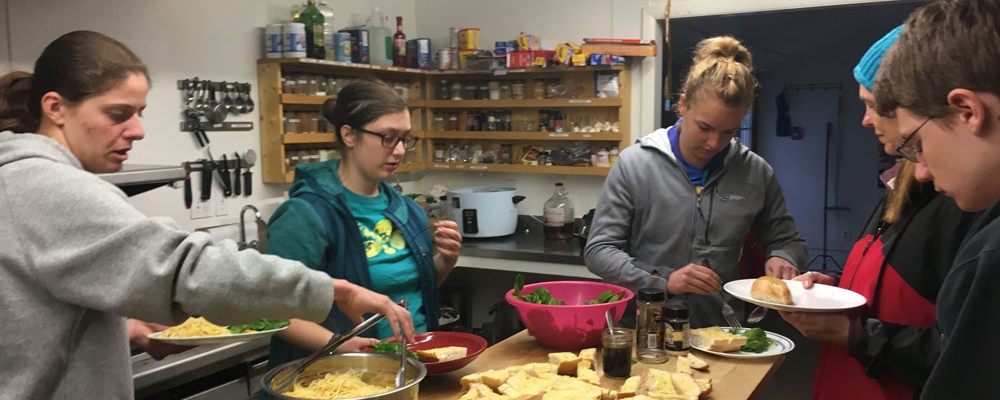Service-Learning in Courses

Service-learning “is a teaching and learning strategy that integrates meaningful community service with instruction and reflection to enrich the learning experience, teach civic responsibility, and strengthen communities.” - National Service-Learning Clearinghouse
If you are interested in adding a service-learning component to your course, please do not hesitate to reach out to the Civic Engagement Office. We are here to help you from beginning to end with whatever questions you may have.
Civic Engagement Office will:
-
Provide information to students and faculty about service-learning.
-
Develop and sustain partnerships with community partners to provide service-learning opportunities for students.
-
Provide workshops and other training for faculty who seek assistance with service-learning.
-
Make class presentations to discuss any aspect of the component at the request of faculty.
-
Develop new sites at the request of faculty.
-
Keep a central list of current student placements.
-
Conduct program evaluation.
Faculty will:
-
Establish learning outcomes for the service-learning component of the course.
-
Communicate with the community partner(s) involved to establish outcomes and realistic tasks (Civic Engagement can help make this connection).
-
Incorporate readings, assignments, and reflections that require students to draw connections between their service and the course.
-
Include service-learning as part of the final course grade.
Community partner will:
-
Provide on-site orientation
-
Provide on-site supervision of students
-
Assist students in documenting hours completed
-
Provide feedback to faculty member and the Civic Engagement Office
“Service learning is one powerful, direct way for all of us, including students, to develop, in an enduring way, empathy for the lives and contexts of others.” - President Brand
92% of business leaders believe volunteering expands an employee’s professional skill set.
82% of business leaders are more likely to choose a candidate with volunteering experience.
Three in four employers say they want colleges to place more emphasis on critical thinking, complex problem-solving, written and oral communication, and applied knowledge in real-world settings. 91% of the Class of 2015 reported that their service-learning experience(s) contributed to their development in critical thinking.
You make an impact on your students every day in your courses. Your students in turn make their mark on the world once they graduate. Did you know that students who dive into service-learning opportunities are more likely to:
-
Vote
-
Stay in college
-
Volunteer in their communities
And academically, service-learning impacts students’ academics by:
-
Improving their ability to apply what they have learned in class to the “real world” in the most hands-on manner possible; something that One Course At A Time is distinctly set up to encourage.
-
Promoting analysis, critical thinking, and cognitive development
-
Enhancing retention of the material studies through the hands-on nature of service-learning
In other words, students who participate in service-learning (who might not otherwise do so if they had not gotten involved through their coursework) become productive and engaged citizens.
The Civic Engagement Office is here to help you at any point in the process! Do not hesitate to reach out if you aren’t sure where to begin or get stuck on some aspect.
Before you even start, consider the following questions:
-
How would service-learning enhance my course objectives?
-
What would be an appropriate experience (consider social activism, public scholarship, community advocacy, and direct service)
-
Is there a community partner with needs that match my goals? Do they have the capacity for us to work together?
-
How will I evaluate what the students are learning through service-learning?
Once you have decided to incorporate service-learning, consider the following:
-
Plan in advance to find a community partner with needs that meet your learning outcomes.
-
Ensure your syllabus incorporates service-learning by providing information and including the service-learning experience in assignments, readings, and reflections. Be sure to include expectations/requirements around the actual service-learning experience such as travel, time commitment, etc. Consider the following questions:
-
What is service-learning and why is it important?
-
What is service-learning included in this course and how will it work?
-
Don’t be afraid to ask your community partner to help develop assignments!
-
-
Introduce service-learning early and talk about why it is being included as part of your course
-
Provide ongoing support and integration for students
We realize that the block plan can be a challenge for incorporating “traditional” service-learning experiences. The Campus Compact Resource Library also provides sample syllabi from other institutions to help you get started.
Campus Compact - Campus Compact is a national coalition of 1,000+ colleges and universities committed to the public purposes of higher education. We build democracy through civic education and community development.
-
Mini-grants
-
Articles on service-learning
-
Sample syllabi from other institutions
-
Recognition for engaged faculty, staff, students, and institutions
Iowa Campus Compact - Iowa Campus Compact (IACC) is a statewide association of college and university presidents providing leadership for the civic mission of higher education. Iowa Campus Compact strengthens the capacity of our member colleges and universities to prepare all students to become engaged citizens.
-
Local events and opportunities to connect community engaged faculty and staff in Iowa
-
Iowa-based initiatives
-
Recognition for engaged faculty, staff, students, and institutions
National Service-Learning Clearinghouse - The Clearinghouse offers thousands of free online resources for K-12, higher education, community based organization, and tribal communities.
